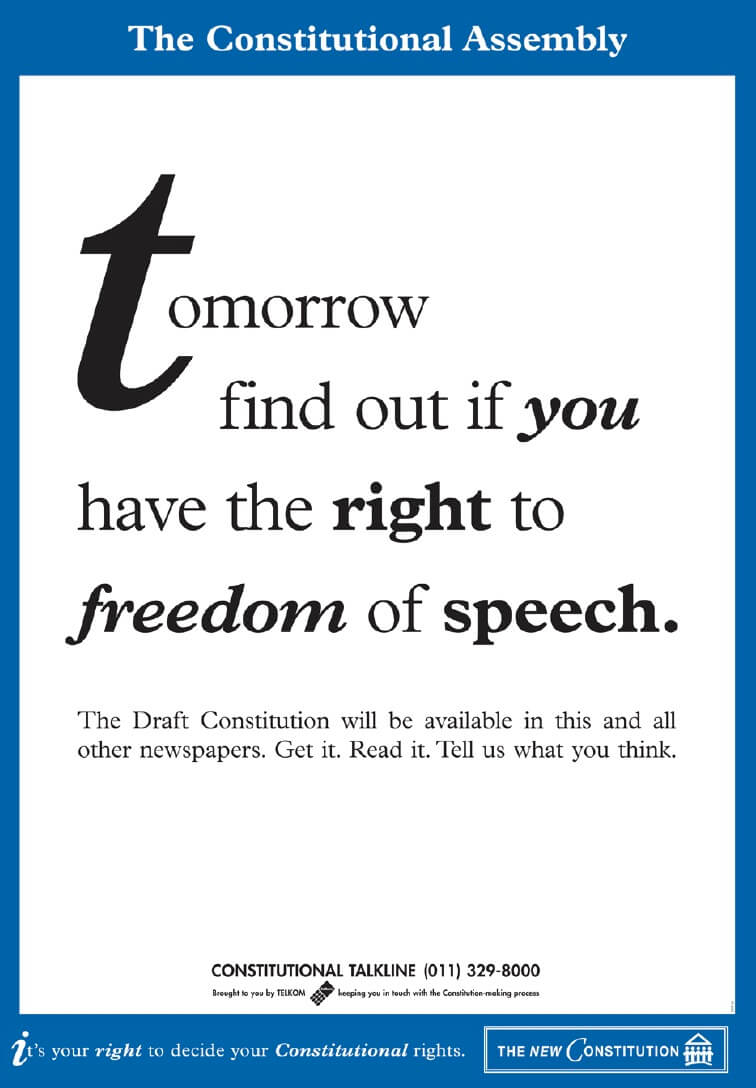1 DAY AWAY
I know it’s late but just twenty minutes more, just twenty minutes – for our Constitution which is for the next twenty years, no, fifty years, 100 years, 200 years.
CYRIL RAMAPHOSA
then Chair of the Constitutional Assembly, urging the tired drafters to keep going
While the political parties were urgently engaged in bilateral and multilateral meetings, the IFP met elsewhere in the Parliament building to prepare its case as to why it would continue to boycott the adoption of the Constitution. For the IFP, the draft constitution was still a recipe for a ‘totalitarian autocracy’.
This Bill has been described by the Chairman as the birth certificate of a new nation, while on a more attentive analysis it is the advanced death certificate of pluralism, federalism, and freedom of a country which, constitutionally speaking, is committing suicide by installments.
Statement by the IFP
The Freedom Front, meanwhile, was locked in its own dilemma. According to Corné Mulder:
After a discussion that went through the night, we took the decision that while there are certain positive things that we would like to support, there are other things that we cannot support. In terms of what our constituency expects, we cannot be seen to support the education clause, the Preamble and some of the other issues. Those made us take the decision not to vote and to abstain from the process.
Corné Mulder
then Freedom Front member of the Constitutional Assembly
In response, the ANC was highly disappointed. The party felt it had gone out of its way to address the FF’s concerns throughout the process. After multiple stops and starts, the CA eventually resumed its debate with all parties at 5.30 p.m. Finally, at 10:45 p.m. the committee members began to emerge.
For most of us it was no different to the experience of an expectant parent waiting to see a newborn after a long and difficult labour.
Hassen Ebrahim
then Executive Director of the Constitutional Assembly
Dr Blade Nzimande announced that he was able to present a clause that ‘once and for all closed the chapter on apartheid education in the country’. Resolution was reached by including single-medium institutions as one of the alternatives to be considered by the state in securing people’s right to be taught in one’s home language or the language of one’s choice. After a last further compromise amendment by the DP, the clause was accepted by all parties. Next, Willie Hofmeyr’s amendment to the lock-out clause, which involved deleting the provision from the Bill of Rights, was generally accepted. The DP objected, as did the NP.
We will oppose it, but not to the extent that we will vote against the Constitution.
Roelf Meyer
Then National Party member of the Constitutional Assembly
Lastly, Dullah Omar reported on the controversial property clause. The proposed amendment ensured that those who owned property would not be arbitrarily deprived of their assets while at the same time the new clause recorded the need for land reform.
There were no longer days to the deadline but, rather, hours. Some analysts contend that for the opposition parties these final resolutions were less about seeking consensus than about suspending their demands and that the NP simply ‘surrendered’ Afrikaner sovereignty at this point. Some go so far as to say that De Klerk’s negotiators were really a part of Mandela’s team in facilitating the transition to majority rule. But the key NP negotiators view this moment very differently.
For Roelf Meyer, the accusation that the Afrikaners meekly handed over power when the chips were down could not have been further from the reality.
We have succeeded in bringing democracy to South Africa and that was the overall determining objective. There could be no real democracy if one would have tried to retain certain vetoes for minorities whatever the case may be.
Roelf Meyer
Then National Party member of the Constitutional Assembly
The parties reached a settlement. Leon Wessels, who was chairing this final session remembers his final words:
May I interrupt the members’ beautiful singing. According to my notes I have to conclude the proceedings at 12.00 pm. Just as we delivered the Constitution timeously, we shall close the proceedings timeously. The proceedings are now closed. I believe everyone should be proud of the fact that we finished our task in good time. It is our common South Africanness that had triumphed.
LEON WESSELS
Then Deputy Chair of the Constitutional Assembly
The final resolution of all issues paving the way to adoption on 8 May 1996 was recognised by all as a victory that each party celebrated in equal measure. There was no scoring of points. We had together reached the finish line after an extremely long arduous journey. When the moment came, everyone was just happy and pleased to savour the moment not for the gains made by any party, but by the country as a whole. After all the bickering and gamesmanship, the political players had come of age and grown immeasurably. They were not ready to take the country to the next stage. The Constitutional Assembly plenary scheduled for the adoption of the constitution was momentous as it was grand.
Hassen Ebrahim
then Executive Director of the Constitutional Assembly.
Members of the Constitutional Committee argued, differed and fought but I also saw them embracing when we reached agreement on a matter which most of us thought we would never reach. I saw tears in their eyes, and I know that they were a group of people who would indeed deliver a Constitution to this country. I thank them most sincerely.
Cyril Ramaphosa
then Chair of the Constitutional Assembly


